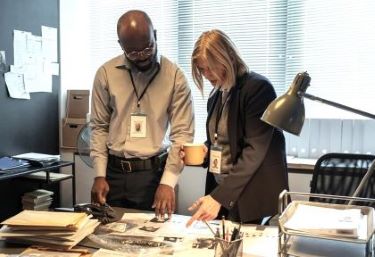
Detectives and criminal investigators are uniformed or plainclothes officers who gather facts and collect evidence related to criminal cases. Private detectives’ and investigators’ work settings may depend on their assignment or case. For example, they may spend time in offices to research cases, or they may work in the field while doing surveillance.
They conduct interviews, examine records, monitor suspects, and participate in raids and arrests. Detectives typically investigate serious crimes, such as assaults, robberies, and homicides. In large police departments, detectives usually specialize in investigating one type of crime, such as homicide or fraud. They are typically assigned cases on a rotating basis and work on them until an arrest and trial are completed or until the case is dropped.
Federal law enforcement agents undergo extensive training, usually at the US Marine Corps base in Quantico, Virginia, or at a Federal Law Enforcement Training Center. Federal Bureau of Investigation (FBI) agents, sometimes called special agents, investigate and pursue criminal cases that violate federal law. FBI agents are responsible for crimes against public agencies, such as Medicare fraud, or that cross state lines.
Criminal Law and Procedure covers the fundamental principles of criminal law, including criminal offenses, legal definitions, and the constitutional rights of suspects and defendants. Investigative Techniques topics may include crime scene management, evidence collection and preservation, forensic techniques, witness interviews and interrogation, surveillance methods, and case documentation.
Effective written communication is crucial for documenting investigative findings, preparing reports, and presenting evidence in court. This course teaches officers how to write clear, concise, and accurate reports that comply with departmental standards and legal requirements. Further, investigating officers must be skilled in conducting interviews and interrogations to obtain information from witnesses, victims, and suspects. This course covers techniques for building rapport, asking effective questions, detecting deception, and obtaining truthful and admissible statements.
Defensive Tactics Certification equips law enforcement officers with the skills needed to protect themselves and others during physical altercations. This training includes techniques for blocking, striking, grappling, and controlling resisting subjects. Officers learn how to safely subdue suspects using minimal force while minimizing the risk of injury to all parties involved. Regular training and practice are essential to maintain proficiency in defensive tactics.
| Position | Skills Required | Certification or Exam |
| Police Sergeant | Leadership, supervisory skills, operational management | Police Sergeant Promotional Exam (varies by jurisdiction) |
| Fraud Investigator | Financial analysis, investigative techniques, fraud detection | Certified Fraud Examiner (CFE) Exam by the Association of Certified Fraud Examiners (ACFE) |
| Financial Crimes | Forensic accounting, cybercrime investigation | CFCI Exam by the International Association of Financial Crimes Investigators (IAFCI) |
| Vice Squad | Undercover operations, surveillance, investigation of prostitution, gambling, drug trafficking | Vice and Narcotics Investigations Certification by IACP |
| Homicide Detective | Crime scene investigation, forensic analysis, interviewing and interrogation | Certification by the American Board of Criminalistics (ABC) |
| Internal Affairs | Investigations, ethics, compliance, administrative law | Certification by the International Association of Chiefs of Police (IACP) |
Hostage Negotiation Certification prepares law enforcement officers to effectively communicate with individuals in crisis situations, such as hostage-taking or barricaded suspects. This training emphasizes active listening, empathy, rapport-building, and de-escalation techniques. Negotiators learn to assess the motivations and emotional states of individuals involved in high-stress situations and work toward peaceful resolutions without resorting to violence.
Field Experience: After graduating from the police academy, officers typically spend several years gaining experience in patrol duties, responding to calls for service, and interacting with the community. This field experience is invaluable for developing practical skills, understanding police procedures, and building familiarity with local laws and neighborhoods.
Former FBI agent and body language expert Joe Navarro breaks down the various ways we communicate non-verbally.
In Lincoln County, Nebraska, a fugitive drug dealer engaged in a shootout with state troopers, and eluded capture after a high-speed chase.
Former Chief of Disguise for the CIA, Jonna Mendez, explains how disguises are used in the CIA, and what aspects to the deception make for an effective disguise.
A deposition is a statement taken of a party or a witness, under oath, in front of a court reporter. All statements given may be used in court. It is one of the most important tools that lawyers use to gather evidence and preliminary information about a case.
Ask yourself if you can see yourself as a federal investigator. If challenge and excitement fit the bill, then you may trade off on danger and personal risk. While classes and internships will prepare you well, certain innate qualities that you bring to bear will help you succeed.
Attending college offers benefits beyond academic learning. Students are exposed to diverse perspectives that challenge their thinking. This fosters problem-solving and communication. College is also about social skills. Whether through student organizations or sports teams, students develop leadership skills and build lasting friendships.
This website is not affiliated with any educational institution, and all trademarks are the exclusive property of the respective owners. All copyrighted works on this website are offered for educational purposes only, governed by the four-factor rule, section 107 of the Copyright Act. CampusInspector.com is the work of a group of students in Bangkok, using data from the US Department of Education, Postsecondary Education Data System (IPEDS). If any information is incorrect, please contact us with updates.